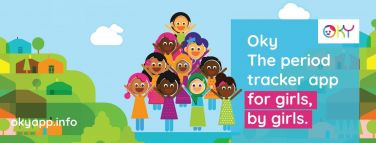Period tracker app debunking ‘menstrual myths’ to be used in gov’t programs

MANILA, Philippines — A new period tracker app that puts a premium on both menstrual health management and education is set to be used in the government's sexual education and reproductive health programs targeting adolescent girls.
Launched on Friday, the Oky Philippines Period Tracker app aims to help address the pressing need among adolescent girls for reliable information on menstrual health and hygiene management.
The app, which can be downloaded online for free, features not just accessible tools to manage menstrual health, but also lessons debunking period myths and misconceptions that typically proliferate on social media, according to Plan International Philippines.
Among others, the app features an encyclopedia of information on gender, puberty, menstrual health and reproductive health rights, as well as information for persons with disabilities on managing their periods.
The app was jointly created by the Department of Education (DepEd), Department of Health (DOH), Commission on Population (POPCOM), National Youth Commission (NYC) and UNICEF Philippines in partnership with Plan International Philippines.
Its launch also comes days before World Menstrual Health Day on May 28.
“The DOH prioritizes adolescent sexual reproductive health in our programs and campaigns. We recognize the need of adolescent girls to access accurate information about their menstrual health and are happy to have the Oky Philippines app as a new digital platform that can help them make informed, healthy choices for themselves,” said DOH Officer-in-Charge Maria Rosario Vergeire.
The period app, which was patterned after Oky, “the world’s first menstruation education and period tracker app co-created by UNICEF with girls for girls,” is a new platform that will be deployed through existing government programs, according to Plan International Philippines.
This includes DepEd’s Comprehensive Sexual Education and the WASH in Schools programs, which deal with students’ access to drinking water, sanitation and hygiene.
The app will also be used in the DOH and POPCOM’s campaign “I CHOOSE #MalayaAkongMaging” – an initiative that promotes awareness and information drives on adolescent health and development, including adolescent sexual and reproductive health concerns.
Developers of the app took into account the diverse contexts of girls in the Philippines, including indigenous peoples, out-of-school children, and children with disabilities. These were then vetted by adolescent health experts from government agencies and development organizations.
The period tracker app also includes content relevant to the Islamic culture, co-created with adolescents in the Bangsamoro Autonomous Region in Muslim Mindanao, according to Plan International.
The app is also supported by the Australian Government through its AUD 48-million Indo-Pacific Sexual Reproductive Health and Rights COVID-19 Surge Response.
DepEd WASH data shows that four out of five schools provided access to sanitary pads to girls during the school year 2020-2021 — higher than the three out of five recorded in 2017-2018.
“While the improved access to menstrual hygiene products in schools is remarkable, menstruation and sexual reproductive health rights remain sensitive topics for discussion,” Plan International said.
“More concerning is that myths and misconceptions about menstrual health proliferate on social media – hindering girls’ access to important information critical to understanding their right to reproductive health,” the group noted.
DepEd estimated in January that only around 1.1 million learners or about 3.4% of the estimated 32 million Filipinos aged 5 to 19 years old have taken lessons in Comprehensive Sexual Education.
In its draft curriculum for K to 10, DepEd has proposed the inclusion of "sexual reproductive and health rights" and "healthcare needs and rights" as early as Grade 4 to help enhance students' health literacy. -- Cristina Chi
RELATED: Proposed DepEd curriculum teaches sexual and reproductive rights starting Grade 4



















